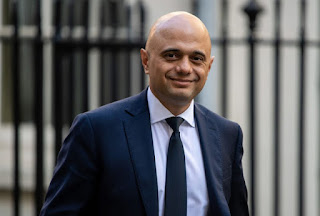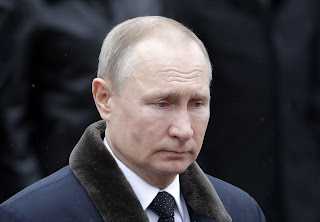In the last
6 months of international crisis over Russia’s threats to Ukraine Western with
a build-up of 180,000 armed Russian troops stationed around the southern,
eastern and northern flank of Ukraine’s borders, Western governments considered
it wise not to carry out defence policies that could be considered provocative
by the Russian government. There was an awareness that the Russian government
was even looking for some kind of provocation, as an excuse for taking action,
even to the extent of considering a “false flag” episode, similar to the
Gleiwitz incident on the eve of the invasion of Poland in 1939, when Germany
dressed some concentration camp prisoners in Polish army uniforms and staged
their supposed “attack” on a German radio station near the Polish border. There
were even proposals by some Western leaders to reduce the tension by confirming
that Ukraine would never be allowed to join NATO, thus giving Putin a new easy
concession and opening themselves up to more pressure from Russia. Putin
encouraged President Macron and Chancellor Scholz with that approach but
realized after the Munich Security Conference on February 20th held
under the banner heading of “Unlearning Helplessness”, also attended by
President Zelensky accusing the West of “appeasement”, but boycotted by Russia,
that the main NATO governments would resist any concessions. The next day the
Russian Duma announced recognition of independent republics of Lugansk and
Donetsk and the countdown to invasion on February 24th had begun.
We can
gauge President Putin’s attitude to Ukraine’s independence from a paper he had
published which argued that Ukraine was
never an independent country in its history and was always part of Russia since
the early Middle Ages. On that basis he considered the threat of Ukraine
joining the EU and NATO as being unacceptable to Russia’s security, as Ukraine
was supposed to be part of Russia’s sphere of influence. The hostility of the
Russian government to NATO’s expansion in the last 30 years had become a
dominant theme in more recent foreign policy declarations. Putin saw his role
as lifting Russia out of the depression that it suffered since the collapse of
the Soviet Union, when Russia lost vast tracts of what happened Soviet
territory in Central Asia, the Caucasus and Eastern Europe and became a prey to
Western liberal democracy and a feral capitalism that led in 1998 to a savage
recession and a financial crisis.
Since
gaining power Putin has ended the independence of local governors and the
political ambitions of independent oligarchs, destroyed Chechnya’s bid for
independence and subordinated the Central Asian republics, as well as Belarus
and Armenia, to conform to Russia’s strategic military and economic interests.
He has suppressed democratic freedoms in Russia and has reacted strongly
against the spread of Western style democracy in Belarus and Georgia, and now
Ukraine. He seized Crimea in 2014 on the grounds that this was always Russian
territory since the end of the eighteenth century and noted that while Western
governments protested and did not recognize the annexation, their military and
economic responses were largely cosmetic.
As the
Russian economy suffers, he has sought to retain popularity and power by
stifling internal opposition and given Russians the hope of restoring its
former pre-eminence in world affairs, while identifying all aspects of Western
liberal democracy as Western imperialism and a threat to the Russian way of
life. For Putin the need to suppress democracy both in Russia and Ukraine is
essential to ensure that he retains personal power in Russia. Once he had
commenced the military build-up around Ukraine, he needed to show tangible
results of some kind of success in order to survive. He could not keep troops
there indefinitely in primitive living conditions with many sleeping in the
open air and without proper food rations. The Munich Security Conference showed
he had no option but either to withdraw in humiliation or to carry out his
threat to invade.
The Western
governments have threatened sanctions in case of any military incursion and are
now seeking to implement them. Initially they planned to do this gradually, but
the decision to invade Ukraine on all fronts on February 24th has
speeded up the process. It involves restrictions on the ability of Russia to
raise funds in the international finance markets and sanctions against leading
banks and individuals who are responsible for military action and the
disinformation campaign. These sanctions are likely to extend to more than 300
Duma members who voted in favour of recognizing the self-proclaimed republics
of Donetsk and Luhansk. There also remains the threat, not yet implemented, of
Russia being banned from Swift, a widely used global payment system, and for
banning any exports to Russia of hi-tech products, including computers and
telecom equipment. There could also be consideration of an immediate boycott of
Russian airspace for a limited period.
Unfortunately,
the sanctions are unlikely to be successful in saving Ukraine from Russian
invasion.
Firstly,
because Russia has been preparing to face expanded sanctions since the
annexation of Crimea in 2014. It has built up foreign currency reserves of $630
billion, an increase of 75 per cent since 2015. It now has the fourth largest
currency reserves in the world, despite being only the 11th largest economy.
The reserves are akin to a third of the Russian economy and even if Germany and
other EU states cease to buy Russian gas, Russia can sell a large part of it to
China instead, through the Power of Siberia gas pipeline, which is currently
being upgraded.
Secondly,
Putin gambles on the fact that the West is not prepared to take serious — and
sustained — economic pain for Ukraine. On February 21st the
emotional televised meeting of the Russian National Security Council showed a
confidence in Putin’s circle that the sanctions will either not be that
comprehensive or will not be strictly enforced for that long. Russia provides
40% of the EU’s oil and coal, and 20% of its gas. Germany in particular will be
under pressure to end the boycott of the newly completed second Nord Stream
pipeline supplying gas from Siberia, while the UK will be reluctant to lose the
vast private investments of Russian oligarchs in the UK economy. Blocking
Russia’s access to Swift could leave many European banks financially exposed
and could lead to Russia relying on financial trading through the China
Development Bank and the China Export-Import Bank. Furthermore, the populations
of Western Europe would suffer from a further dramatic increase in the price of
oil.
The Russian
government believe that Western leaders have not yet told their citizens that
sanctions will worsen the cost of living crisis, will raise energy prices and
push inflation higher. Until the Russian ruling class hears democratic
governments levelling with their electorates on that, they will remain
confident that they can handle whatever sanctions the West imposes and the
sanctions will only be ineffectual and temporary.
In fact,
the only effective sanction against Russia is not economic at all, but a
military one. In the first place we can support Ukrainian resistance with arms
while the conflict is proceeding, with economic help and with military
intelligence. However, this will not prevent further war. What may do is the
realization that if Putin triumphs in Ukraine unchallenged then his hostility
to NATO may take him further. Should President Putin seize a large swathe of
Ukraine, he will not stop to make peace at its borders. He may not invade the
Nato countries that were once in the Soviet empire, at least not at first. But,
bloated by victory, he will subject them to the cyber attacks and information
warfare that fall short of the threshold of conflict. He may threaten the
Polish and Romanian borders by “accidentally” crossing the border while
harrowing escaping refugees.
The USA,
the UK, Canada, France and Germany are increasing the size of their permanent
contingents in Poland and the Baltic States and are promising to send more.
Putin would feel vulnerable to the threat and the eventual follow through of a
massive military build-up on NATO’s eastern flank, which would also include
introducing medium and long-range missiles in Poland, Romania and the Baltic
States and an open invitation for Finland and Sweden to join NATO. The
integrated Long Range Missile Intercept programme planned for Poland as a
measure against Iran could be resuscitated against Russia following its
suspension in in 2009. This would have been considered provocative only 3
months ago, but now Russia is too busy invading Ukraine and NATO is capable of
introducing these extra measures and to brave Russian anger, without the fear
of a direct military challenge from Russia. Such a threat could even give
President Putin pause to rethink his strategy in Ukraine, as it should be
described as a direct consequence of the invasion of Ukraine. This needs to be
announced quickly as we do not know how long Ukrainian resistance will last.
They also
need to reinforce a “no fly zone” in the immediate vicinity of NATO country
borders and announce it this week before the skies over Western Ukraine are
dominated by the Russian air force.
Such
military measures reassure the countries on the eastern flank of NATO that they
are being adequately protected from attack by Russia and that Article 5 of the
NATO treaty would be invoked if they were attacked. It would show that the NATO
alliance is ready to challenge any new expansion of Russia and cause Russia to
see this as a direct consequence of its invasion of Ukraine.
It will
also send a signal to China that the Western alliances in Europe, North America
and Asia are determined to stand up to aggression and that it would not be
advantageous for China to side too strongly with Russia over Ukraine or to
contemplate this moment to invade Taiwan.
Wiktor
Moszczynski







